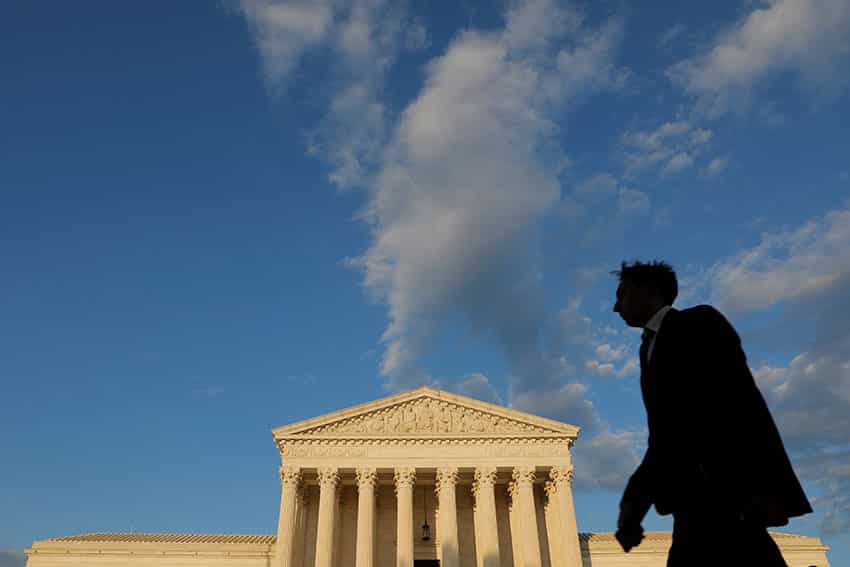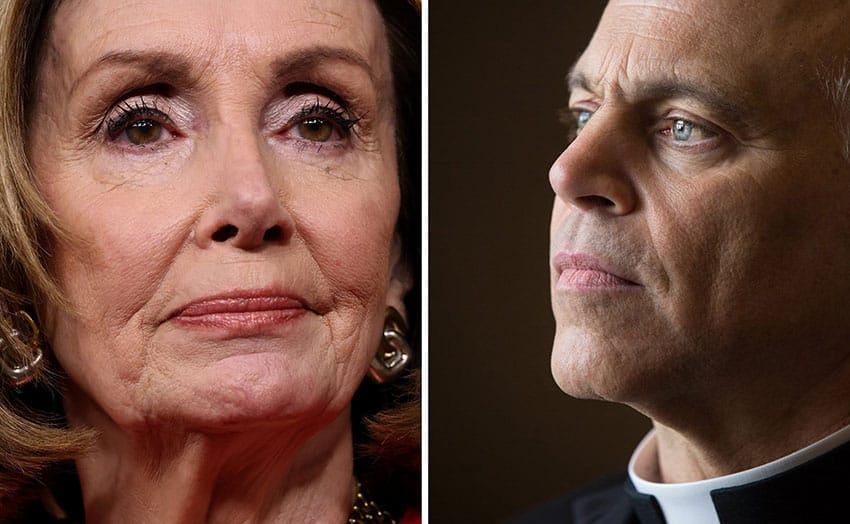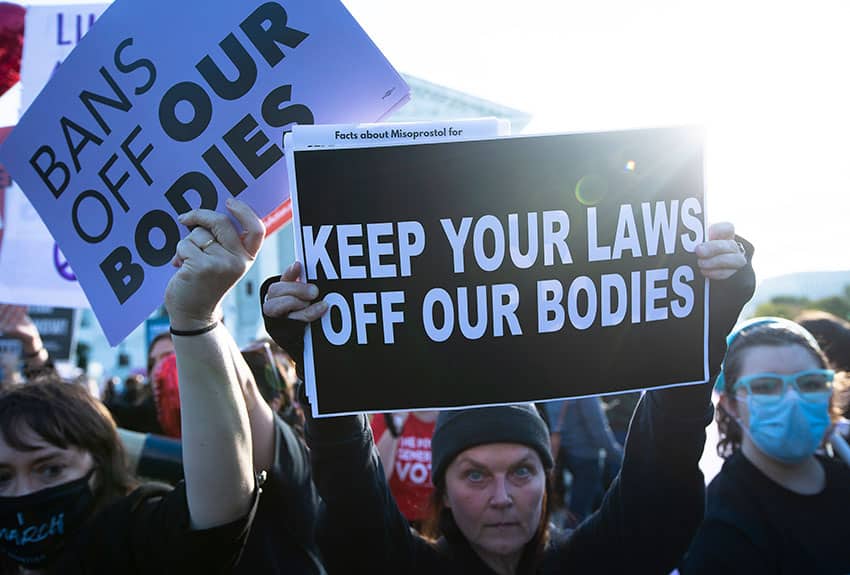
Growing political tensions and threats over abortion see US bishops divided
Two weeks ago, on 12 June, abortion activists barged into a Catholic Church in Michigan during Mass. The protesters shouted, “Overturn Roe? Hell, no!” and “Abortion without apology!”
Earlier that same week, 26-year-old John Roske was arrested outside Supreme Court Justice Brett Kavanaugh’s home with a gun, knife and zip-ties.
He was enraged by the leaked draft ruling of the Supreme Court for a case that would overturn Roe v Wade, the 1973 Supreme Court decision that legalised abortion, and planned to kill Justice Kavanaugh.
Since the draft was leaked two dozen pro-life organisations have been attacked or vandalised across the US, in addition to at least 140 attacks on Catholic Churches across the country since 2020, according to data collected by CatholicVote.
“If abortions aren’t safe, neither are you,” read one tag sprayed on the Capitol Hill Pregnancy Centre in Washington, DC.
The Supreme Court is tipped to hand down its final decision on Roe v Wade by the end of June, and President Joe Biden is already foreshadowing executive action to prop up abortion rights; he has also predicted violence on the night the court hands down its decision.
“US Catholic Bishops Conference President Archbishop José Gomez said the document was not primarily to address political matters, but was on the agenda to prepare for a national eucharistic conference and correct plummeting belief in the real presence among US Catholics.”
Abortion is not the only issue deeply dividing US society. Debates over gun rights and school shootings, gender ideology, racism and a plethora of other issues are polarised to the extent that rumblings of future civil war or national “divorce” are openly discussed in the mainstream media.
The Catholic Church in the US has hardly remained aloof from these divisions, but abortion more than any other issue has posed a wicked dilemma for the US bishops: should something be done about Catholic politicians who advocate for abortion rights while continuing to receive the eucharist, including US President Joe Biden and House of Representatives Speaker Nancy Pelosi?
In November 2021 the US bishops approved a document on the real presence of Christ in the eucharist, The Mystery of the Eucharist in the Life of the Church.
US Catholic Bishops Conference President Archbishop José Gomez said the document was not primarily to address political matters, but was on the agenda to prepare for a national eucharistic conference and correct plummeting belief in the real presence among US Catholics.
“What happened is for the media, especially the secular media, it’s all about the political issue,” Archbishop Gomez said in a 2021 interview with Crux.

But according to the National Catholic Reporter, it was “always about Biden”.
“The truth is the document has been the pet project of a crowd of right-wing bishops—several of them committee heads—who convinced [Archbishop Gomez], that it was a good idea to play hardball with Joe Biden,” the paper’s editorial of November 8 said.
Indeed in the debate prior to the document’s publication then-Bishop, now Cardinal-elect, Robert W. McElroy of San Diego published an essay in America magazine calling into question whether “unworthiness” to receive the eucharist was a useful category to apply to political issues.
Moves to debar pro-choice Catholic politicians would effectively “weaponise” the sacraments in service of political aims, he wrote.
“At a time when we are emerging from a pandemic and seeking to rebuild the eucharistic community, it would be particularly wounding to embrace and emphasise a theology of unworthiness and exclusion rather than a theology that emphasises Christ’s unrelenting invitation to all,” he wrote.
Despite their disagreements, The Mystery of the Eucharist in the Life of the Church was resoundingly approved by the US bishops. It also left the Biden-Pelosi question unresolved.
“In letters to priests and laity Archbishop Cordileone wrote that he made several attempts to meet with Speaker Pelosi after she announced in September 2021 she would move to codify Roe v Wade in legislation, rather than leaving it to the mercy of future Supreme Court decisions.”
“It is the special responsibility of the diocesan bishop to work to remedy situations that involve public actions at variance with the visible communion of the Church and the moral law,” the document stated.
Archbishop Salvatore Cordileone of San Francisco, a leading conservative whose archdiocese encompasses Speaker Nancy Pelosi’s congressional district, acted on this responsibility in May.
In letters to priests and laity Archbishop Cordileone wrote that he made several attempts to meet with Speaker Pelosi after she announced in September 2021 she would move to codify Roe v Wade in legislation, rather than leaving it to the mercy of future Supreme Court decisions.
By the time the Supreme Court’s draft ruling was leaked in May this year, Archbishop Cordileone had contacted Speaker Pelosi half a dozen times.
The final straw, according to Archbishop Cordileone’s letter, was Speaker Pelosi’s response to the leaked ruling on 4 May.

“The very idea that they would be telling women the size, timing or whatever of their family, the personal nature of this is so appalling, and I say that as a devout Catholic,” Speaker Pelosi said.
“They say to me, ‘Nancy Pelosi thinks she knows more about having babies than the Pope.’ Yes I do. Are you stupid?”
Archbishop Cordileone debarred the Speaker from Holy Communion.
“[I]t is my determined judgment that this resistance to pastoral counsel has gone on for too long,” he wrote to the priests of his archdiocese.
He addressed the charge of “weaponising” the eucharist directly in his letter, saying his “motive is pastoral, not political”, and was a clear application of Church teaching.
“I also hasten to point out that one can also violate Church teaching and take Holy Communion for a political purpose as well, thus ‘weaponising’ the Eucharist for one’s own ulterior motives,” he wrote.
“Certainly, we should dialogue, and that’s where we start, but you reach a point where you have to say, well, dialogue does not seem to be working.”
Liberal Catholics see the move as a disastrous intrusion by the Church into politics and a step back from the attitude of openness and dialogue preferred by the Holy Father.
Yet support for Archbishop Cordileone’s intervention has also attracted support, with some bishops musing openly on whether dialogue must bring about change or risk becoming “appeasement”.
“Certainly, we should dialogue, and that’s where we start, but you reach a point where you have to say, well, dialogue does not seem to be working,” Bishop Thomas Paprocki of Springfield, Illinois said in the wake of Speaker Pelosi’s ban.
Mere days remain until the predicted overturning of Roe v Wade.
The situation is febrile in the extreme. Americans, Catholic or not, are no doubt holding their breaths in anxious anticipation.
Whatever happens next, one can only hope the US bishops recall the message preached to them at their Spring retreat by Archbishop Anthony Fisher OP: fraternal charity is the essence of the episcopate.
Related Articles:
